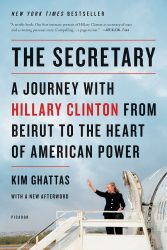 There’s one key aspect of American life that we haven’t looked at yet in Paperback Riders. Politics in the US is characterised by their sense of individualism, and belief in limited government. The influence of special interest and religious groups is more overt than in many other “western democracies”. Money plays a sizeable role in the ability of candidates to stand for office. US citizens are relatively active participants in the political process, compared to other countries. US politics has become increasingly polarised over the last few decades. From the era of Bush, the younger through to the attempted insurrection in January 2021 the gap between the 2 parties has become wider.
There’s one key aspect of American life that we haven’t looked at yet in Paperback Riders. Politics in the US is characterised by their sense of individualism, and belief in limited government. The influence of special interest and religious groups is more overt than in many other “western democracies”. Money plays a sizeable role in the ability of candidates to stand for office. US citizens are relatively active participants in the political process, compared to other countries. US politics has become increasingly polarised over the last few decades. From the era of Bush, the younger through to the attempted insurrection in January 2021 the gap between the 2 parties has become wider.
One of the most polarising figures in recent years has been Hillary Clinton. With her recent inflammatory comments on the Israel/Hamas conflict I was reminded about this book. It covers her time as Barack Obama’s Secretary of State and was written by Kim Ghattas. At the time she worked for the BBC in Washington, but crucially was brought up in Beirut. She opens with the statement: “I grew up in Beirut, on the front lines of a civil war. My father always said, “If America wanted the fighting to end, the war would be over tomorrow.” He waited fifteen years for the guns to fall silent.”
Ghattas uses her experience to reflect on the US’s role in the Middle East, which inevitably dominates the book. She observes Clinton from her arrival to cheering staff at the State Department, known in Washington speak as “The Building”. The US’s image abroad was at a low point at the end of the Bush presidency, so Clinton (and Obama’s) task was rebuilding trust in the USA. Ghattas was part of the travelling press corps, which called itself “The Bubble” who accompanied Clinton on her mission to bring a new vision of the US to the world.
The examination of the USA’s relationship with the rest of the world is one of the most interesting aspects of the book. For an imperial power the US seems curiously unaware of the effect its pronouncements have. The daily State Department press briefing is picked over in the rest of the world, but what is headline news elsewhere is inconsequential in Washington. Ghattas admits to testing this by planting questions about Lebanon and watching them appear in the Beirut press. The US is also shown to be paranoid and grudge bearing. Their attempt to control Iran’s nuclear programme in 2013 being a case in point. The US’s diplomacy was dominated by cold war era concerns about Russia and left over resentments about the 1979 Iran hostage crisis. This allowed Turkey the chance to broker a deal which the US did its best to squash simply on the grounds that it “wasn’t invented here”.
 At the end of the first decade of this century the US was shown to be blissfully ignorant of the rise of Chinese power, regarding attendance at a major world trade expo as optional, and when it finally did show up, creating exhibits dominated by American capitalism and consumerism. The irony of the contents of the US gift shop being wholly made in China is not lost on Ghattas but missed by the Americans.
At the end of the first decade of this century the US was shown to be blissfully ignorant of the rise of Chinese power, regarding attendance at a major world trade expo as optional, and when it finally did show up, creating exhibits dominated by American capitalism and consumerism. The irony of the contents of the US gift shop being wholly made in China is not lost on Ghattas but missed by the Americans.
The fact that there was no satisfactory conclusion to ‘The Secretary’ was seen in reviews at the time of publication as a problem. Reading it now it seems inevitable that there is no tidy resolution. Ghattas interviewed Brent Scowcroft, one of the architects of the 1990 war to oust Saddam Hussein from Kuwait. Syria dominated Lebanon at the time and the Syrian reaction to the US action in Kuwait had long lasting effects on the Lebanese. Ghattas is “crestfallen” to learn that Scowcroft knew nothing of this at the time or later. Lebanon simply didn’t matter.
The overriding feeling I got from the book was that in 2012 the US was where the UK had been in the late 40s, a fading post-colonial country with a heightened sense of its own importance. Ghattas suggests that the US has missed that the “nature of power has changed”. She accuses the US of hubris in its war in Iraq in 2003, but also blames the Middle Eastern countries for the outdated “knee jerk” reaction of blaming the USA for the ills of the world. She concludes that “there are too many ways to effect change without the United States.” The USA just doesn’t matter as much as it did.
The politics and diplomacy of the USA matter on a global level, and as such a book that draws back the curtain on the workings of American power is worth rereading, in the light of its seeming impotence to influence events today. A good book to read after this is ‘The New Silk Roads’, by Peter Frankopan. This looks at the growth of China’s influence in the world through investment and trade over the same time frame as ‘The Secretary’, and how little the USA is mentioned in that book is quite revealing.
It might be a bit of a cliché, but this is still the best song about American power. One day the CSNY version from their early 2000’s tours will get a release – in the meantime this is the definitive version.


